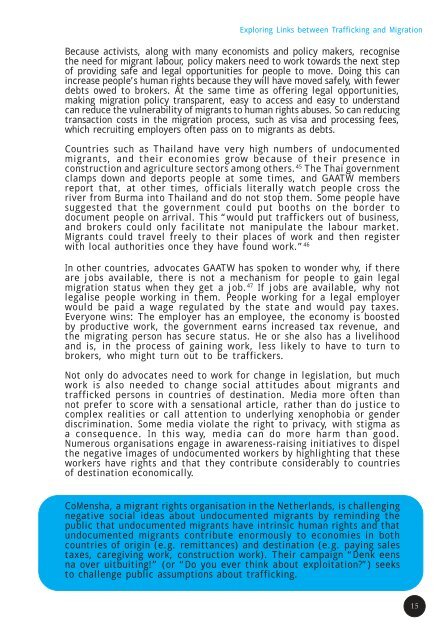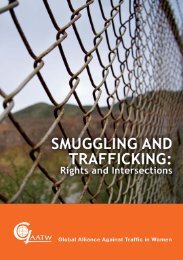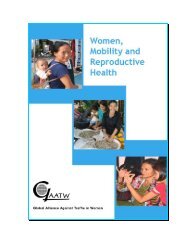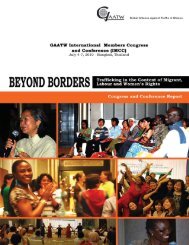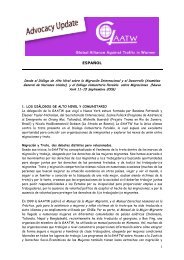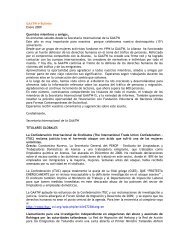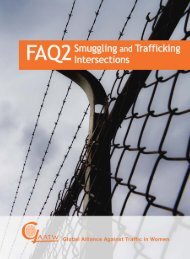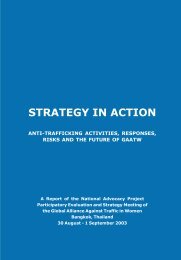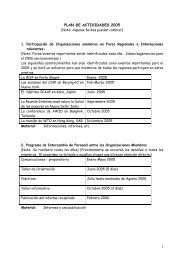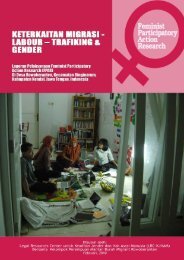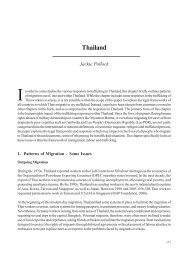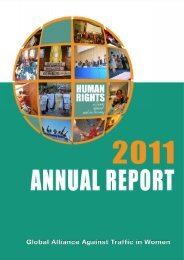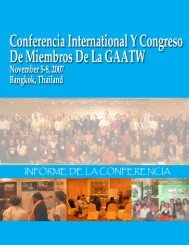Exploring Links between Trafficking and Migration - Global Alliance ...
Exploring Links between Trafficking and Migration - Global Alliance ...
Exploring Links between Trafficking and Migration - Global Alliance ...
- No tags were found...
You also want an ePaper? Increase the reach of your titles
YUMPU automatically turns print PDFs into web optimized ePapers that Google loves.
<strong>Exploring</strong> <strong>Links</strong> <strong>between</strong> <strong>Trafficking</strong> <strong>and</strong> <strong>Migration</strong>Because activists, along with many economists <strong>and</strong> policy makers, recognisethe need for migrant labour, policy makers need to work towards the next stepof providing safe <strong>and</strong> legal opportunities for people to move. Doing this canincrease people’s human rights because they will have moved safely, with fewerdebts owed to brokers. At the same time as offering legal opportunities,making migration policy transparent, easy to access <strong>and</strong> easy to underst<strong>and</strong>can reduce the vulnerability of migrants to human rights abuses. So can reducingtransaction costs in the migration process, such as visa <strong>and</strong> processing fees,which recruiting employers often pass on to migrants as debts.Countries such as Thail<strong>and</strong> have very high numbers of undocumentedmigrants, <strong>and</strong> their economies grow because of their presence inconstruction <strong>and</strong> agriculture sectors among others. 45 The Thai governmentclamps down <strong>and</strong> deports people at some times, <strong>and</strong> GAATW membersreport that, at other times, officials literally watch people cross theriver from Burma into Thail<strong>and</strong> <strong>and</strong> do not stop them. Some people havesuggested that the government could put booths on the border todocument people on arrival. This “would put traffickers out of business,<strong>and</strong> brokers could only facilitate not manipulate the labour market.Migrants could travel freely to their places of work <strong>and</strong> then registerwith local authorities once they have found work.” 46In other countries, advocates GAATW has spoken to wonder why, if thereare jobs available, there is not a mechanism for people to gain legalmigration status when they get a job. 47 If jobs are available, why notlegalise people working in them. People working for a legal employerwould be paid a wage regulated by the state <strong>and</strong> would pay taxes.Everyone wins: The employer has an employee, the economy is boostedby productive work, the government earns increased tax revenue, <strong>and</strong>the migrating person has secure status. He or she also has a livelihood<strong>and</strong> is, in the process of gaining work, less likely to have to turn tobrokers, who might turn out to be traffickers.Not only do advocates need to work for change in legislation, but muchwork is also needed to change social attitudes about migrants <strong>and</strong>trafficked persons in countries of destination. Media more often thannot prefer to score with a sensational article, rather than do justice tocomplex realities or call attention to underlying xenophobia or genderdiscrimination. Some media violate the right to privacy, with stigma asa consequence. In this way, media can do more harm than good.Numerous organisations engage in awareness-raising initiatives to dispelthe negative images of undocumented workers by highlighting that theseworkers have rights <strong>and</strong> that they contribute considerably to countriesof destination economically.CoMensha, a migrant rights organisation in the Netherl<strong>and</strong>s, is challengingnegative social ideas about undocumented migrants by reminding thepublic that undocumented migrants have intrinsic human rights <strong>and</strong> thatundocumented migrants contribute enormously to economies in bothcountries of origin (e.g. remittances) <strong>and</strong> destination (e.g. paying salestaxes, caregiving work, construction work). Their campaign “Denk eensna over uitbuiting!” (or “Do you ever think about exploitation?”) seeksto challenge public assumptions about trafficking.15


